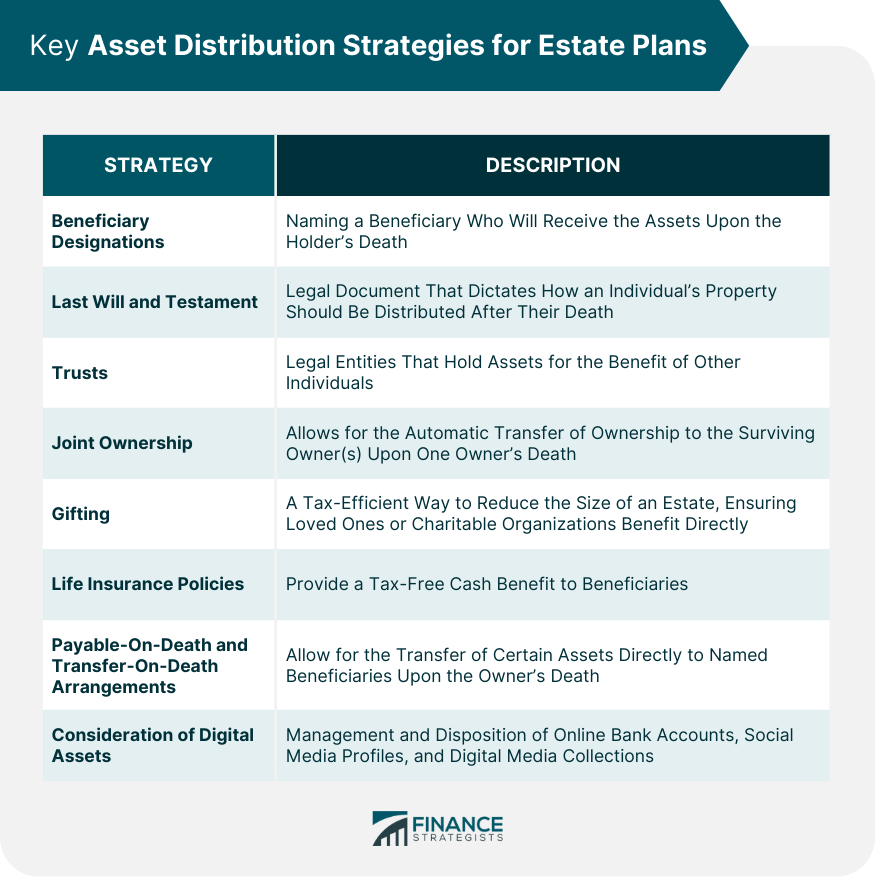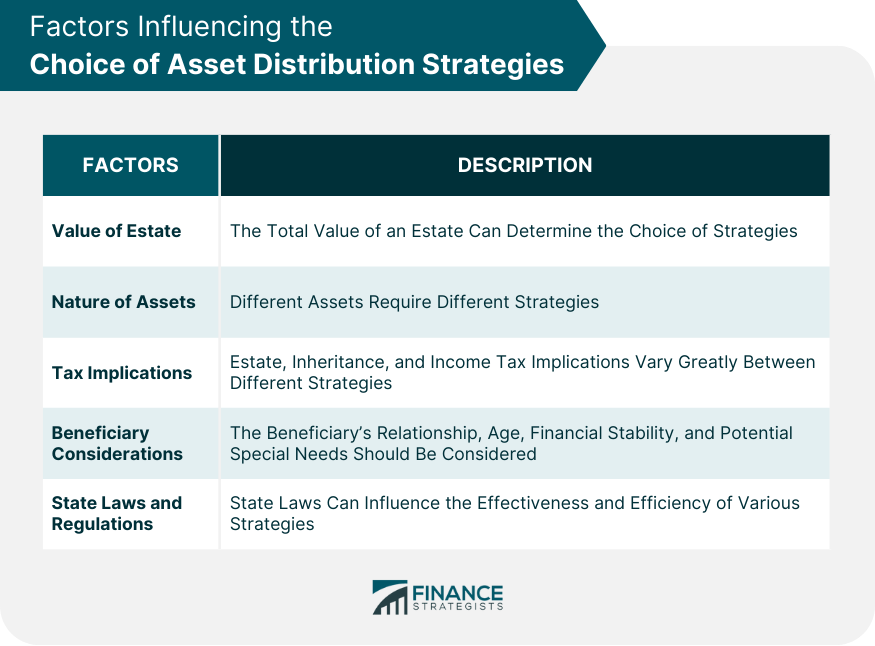Asset distribution strategies for estate plans refer to the methods used to allocate an individual's wealth and property after their death. They form the cornerstone of estate planning, allowing individuals to dictate how their assets should be divided among their beneficiaries. Implementing a well-thought-out strategy ensures a smoother transition of wealth, minimizes legal complications, reduces tax liabilities, and offers peace of mind for the estate holder. These strategies can significantly impact individuals who are planning for their financial future and those of their loved ones. They provide a context within the broader estate planning process, which includes tax planning, probate avoidance, and addressing unique family situations. Understanding and selecting the most suitable asset distribution strategy is a crucial task that requires careful consideration and often professional guidance. There are several asset distribution strategies that individuals can use, each with its unique benefits and drawbacks. Assets like life insurance policies, retirement accounts, and some types of savings accounts allow the account holder to designate a beneficiary who will receive the assets upon the holder's death. This is a straightforward way to distribute assets, bypassing probate. A last will and testament is a legal document that dictates how an individual's property should be distributed after their death. It's a critical component of an estate plan, allowing a person to express their wishes explicitly. Trusts are legal entities that hold assets for the benefit of other individuals, often used to avoid probate, reduce estate taxes, and control how and when assets are distributed to beneficiaries. Owning property jointly allows for the automatic transfer of ownership to the surviving owner(s) upon one owner's death. It is commonly used with real estate, bank accounts, and other assets. Gifting assets while alive can be a tax-efficient way to reduce the size of an estate, ensuring loved ones or charitable organizations benefit directly. Life insurance policies can provide a tax-free cash benefit to beneficiaries, helping to cover any expenses or taxes associated with the estate. These arrangements allow for the transfer of certain assets directly to named beneficiaries upon the owner's death, bypassing probate. In today's digital age, estate planning also involves digital assets. Online bank accounts, social media profiles, and digital media collections are examples of these assets, and arrangements must be made for their management and disposition. The total value of an estate can influence the choice of strategies. For example, larger estates may benefit more from the use of trusts or gifting strategies to mitigate estate tax liability. Different types of assets require different strategies. Real estate, financial investments, business ownership, and personal property each come with unique considerations. Estate, inheritance, and income tax implications vary greatly between different strategies. An understanding of these can help in choosing a strategy that minimizes tax liability. The beneficiary's relationship, age, financial stability, and potential special needs should be considered when selecting a distribution strategy. For instance, trusts can provide control over assets for beneficiaries who might not be ready or capable of managing a large inheritance effectively. State laws can influence the effectiveness and efficiency of various strategies. Consultation with an estate planning attorney is crucial to ensure compliance and maximization of benefits under applicable law. Estate planning is not just about ensuring the smooth transition of assets; it's also about tax efficiency. Understanding the tax implications of your asset distribution strategy can help protect the value of your estate and maximize the inheritance your beneficiaries receive. Trusts, life insurance policies, and gifting can often be structured to minimize estate and inheritance taxes. For instance, Irrevocable Life Insurance Trusts (ILITs) are commonly used to remove the death benefit of a life insurance policy from a taxable estate, while gifting can be used to reduce the size of an estate over time, reducing the potential for estate tax liability. Estate taxes are taxes on the transfer of property after death, while inheritance taxes are taxes on the recipients of those properties. Gift taxes can apply to property transferred while alive. These taxes vary significantly from state to state and depending on the value of the estate. Understanding these taxes and how different strategies can minimize them is a vital part of estate planning. Life insurance can play a critical role in covering estate tax liability. The death benefit can provide liquidity to an estate, preventing the need to sell assets to cover taxes, while also being generally income tax-free for the beneficiaries. Financial planners can assist in understanding the broader financial picture, identifying goals, and developing an integrated estate and financial plan. These attorneys specialize in estates, wills, trusts, and probate. They provide legal advice and services to ensure your estate plan aligns with your wishes, complies with laws, and is as tax-efficient as possible. These professionals can provide advice on tax-efficient strategies and assist in understanding the tax implications of different asset distribution strategies. Estate plans should be reviewed regularly and updated as needed. Life changes, such as the birth of a child, marriage, divorce, death of a beneficiary, or significant changes in net worth, often necessitate a review and possible update of the estate plan. Asset distribution strategies for estate plans are crucial tools that dictate the allocation of an individual's wealth after their passing. These strategies form a critical part of estate planning, with a well-executed approach ensuring a seamless transition of wealth, reduced tax liabilities, and a minimized likelihood of legal complications. It's important to consider the varied methods, from trusts and wills to gifting and life insurance policies, as well as the significant role of professionals in guiding this complex process. Additionally, the importance of regular reviews and updates to the estate plan should not be underestimated. By considering and acting upon these strategies and considerations, individuals can achieve peace of mind, knowing that their financial future and that of their loved ones are secure.What Are Asset Distribution Strategies for Estate Plans?
Understanding Asset Distribution Strategies
Key Asset Distribution Strategies
Beneficiary Designations
Last Will and Testament
Trusts
Joint Ownership
Gifting
Life Insurance Policies
Payable-On-Death and Transfer-On-Death Arrangements
Consideration of Digital Assets

Factors Influencing the Choice of Asset Distribution Strategies
Value of Estate
Nature of Assets
Tax Implications
Beneficiary Considerations
State Laws and Regulations

Implication of Asset Distribution Strategies on Estate Taxes
Tax Efficient Asset Distribution Strategies
Understanding and Minimizing Estate, Inheritance, and Gift Taxes
Role of Life Insurance in Estate Tax Planning
Role of Professionals in Asset Distribution Strategy Planning
Financial Planners
Estate Planning Attorneys
Accountants and Tax Professionals
Importance of Regular Plan Reviews and Updates
Conclusion
Asset Distribution Strategies for Estate Plans FAQs
The main factors include the value of the estate, the nature of the assets, tax implications, beneficiary considerations, and state laws and regulations. These factors shape how different strategies will work for a given estate.
Tax implications play a significant role because different strategies have varying effects on estate, inheritance, and income tax liabilities. Understanding these can help choose a strategy that minimizes the overall tax burden on the estate and beneficiaries.
The nature of the assets is crucial because different types of assets may require different strategies. For example, strategies for distributing real estate, financial investments, or business ownership can differ significantly, each with unique considerations.
Beneficiary considerations are important as they influence the level of control and protection required over the assets. For instance, trusts can be used when beneficiaries may not be ready or capable of managing a large inheritance effectively.
State laws and regulations can impact the effectiveness and efficiency of various strategies. These laws vary by state and can influence probate processes, taxes, and other elements of estate planning. Thus, it's crucial to ensure your estate plan is in compliance and optimized under the applicable laws.
True Tamplin is a published author, public speaker, CEO of UpDigital, and founder of Finance Strategists.
True is a Certified Educator in Personal Finance (CEPF®), author of The Handy Financial Ratios Guide, a member of the Society for Advancing Business Editing and Writing, contributes to his financial education site, Finance Strategists, and has spoken to various financial communities such as the CFA Institute, as well as university students like his Alma mater, Biola University, where he received a bachelor of science in business and data analytics.
To learn more about True, visit his personal website or view his author profiles on Amazon, Nasdaq and Forbes.















